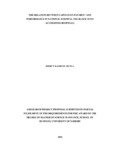| dc.contributor.author | Mutua, Mercy K | |
| dc.date.accessioned | 2017-01-03T08:19:24Z | |
| dc.date.available | 2017-01-03T08:19:24Z | |
| dc.date.issued | 2016 | |
| dc.identifier.uri | http://hdl.handle.net/11295/98574 | |
| dc.description.abstract | Capitation as a mode of payment to NHIF accredited hospitals is an added advantage to the hospital in terms of predictability. Since the payment is made up front, it makes the hospitals‟ income predictable and stable. This makes it more feasible for them to plan and implement service changes. The study sought to establish the relationship between capitation payment and performance in NHIF accredited hospitals. The research design that was used is descriptive study. The target population of this study was all the 1,600 NHIF accredited hospitals in Kenya. Data was collected using both primary and secondary sources. The data collection instruments that were used to collect primary data from the selected respondents were questionnaires and interview schedule. Secondary data was collected from the audited accounts of the hospitals. The data collected was analyzed using descriptive statistics. The relationship between individual independent variables; average length of stay, filing of returns and customer satisfaction surveys were established through Pearson correlation analysis. While the relationship between the independent and dependent variable was established using regression analysis. Analysis of variance (ANOVA) tests was used in the analysis of experimental data to test the variables for statistical significance. The study concluded that bureaucracies in government agencies were the major hindrance in the provision of health care through capitated mode of payment. Lack of employment among patients was the major hindrance to the rolling out of capitated mode in provision of health services. Insurance covers has reduced the levels of costs of accessing health services and lack of specialists is a hindrance to provision of services through capitation of payment. Budgetary allocations, illiteracy among the patients and ignorance of the patients is a hindrance to provision of healthcare through capitated methods. The study recommends the government through the Ministry of Health and the National Treasury should ensure that it allocate enough funds to the ministry and also ensure that it has enough funds through the NHIF fund to ensure the implementation of capitation mode of payment in provision of health services. The government should educate the citizens on the importance of enrolling with the NHIF and also remove political interferences and the bureaucracies in government agencies which are a major hindrance in the provision of health care through capitated mode of payment. Since capitation payment in particular has important implications on market structure and competitive behavior among providers‟ subject to capitation payment incentives it is important that the government understands and is able to anticipate these implications in order to design appropriate policies and necessary regulations. | en_US |
| dc.language.iso | en | en_US |
| dc.publisher | University of Nairobi | en_US |
| dc.rights | Attribution-NonCommercial-NoDerivs 3.0 United States | * |
| dc.rights | Attribution-NonCommercial-NoDerivs 3.0 United States | * |
| dc.rights.uri | http://creativecommons.org/licenses/by-nc-nd/3.0/us/ | * |
| dc.rights.uri | http://creativecommons.org/licenses/by-nc-nd/3.0/us/ | * |
| dc.subject | Capitation Payment and Performance | en_US |
| dc.title | The Relation Between Capitation Payment and Performance in National Hospital Insurance Fund Accredited Hospitals | en_US |
| dc.type | Thesis | en_US |



